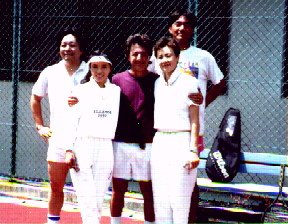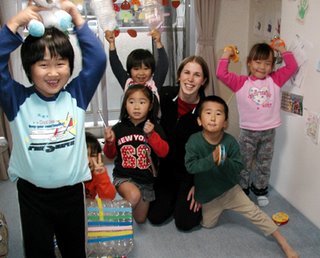
"Share everything. Play fair...When you go out into the world, watch out for traffic, hold hands, and stick together."--Robert Fulghum, All I Really Need to Know I Learned in Kindergarten
My wife and I established our first school in 1991: our Tsukahara School, and we now have four schools located in Minami AshigaraCity, Odawara and Hadano (Shibusawa Station.)
At these schools we have a huge collection of teaching materials,enough to rival or surpass many colleges and universities teaching EFL. All of our schools are equipped with a computer and students and teachers may use them. We have an EFL software library which studentsmay use at our schools. Students are also encouraged to borrow books,CDs and cassettes, from the small libraries we have at each school.
Most students come once or twice a week for 50, 60 or 90 minutelessons. As this adds up to only 8-12 hours per month or so ofEnglish study, we encourage them to use software, books, and videos athome. Slowly their time in the classroom and doing home study addsup, and reaches a point where there is noticeable improvement.
We have some classes for "returnees," or children who have lived abroad or speak English at home and are fluent or nearly fluent.

Pictured: Dustin Hoffman playing tennis with KES staff and students
In terms of curriculum, for the most part we allow our teachers to choose what teaching materials they will use. But for childrenaged 6-12 the first two texbooks they will use are Finding Out 1 and 2 by David Paul. If new students aged 6-12 can read well,then they can study in an existing class using a different textbook. So far we haven`t found a better method for teachingstudents to read than David Paul`s Finding Out method.
Teachers will betaking over existing classes, and they will need to finish the materials(textbooks etc) that were used by the previous teacher. Afterfinishing the previous teachers text, you would be able to chooseyour own textbooks subject to the approval of the manager`sIkumi and Kevin. We rarely veto a teacher`s choice however.
Currently, we use a variety of textbooks. The Finding Out series byDavid Paul is used in most of our children's classes. We alsoare using English Land in some. We also have the children read story books from our extensive collection. We supplement these texts with other activities encouraging speaking.
For adults some of the texts we use include: the NewInterchange series, Talk Your Head Off, J-Talk, Expressways, Passport and others. Some teachers use the many free articlesavailable on the internet as a point of departure for these classes. Many links to teachers resource sites can be foundin the forum for Kevin`s English Schools at Yahoo Groups:
We encourage all of our teachers to bring in materials which theythink are of value. If teachers use what they like, and believe in,what they are using, they will be happier about it, and will do abetter job of teaching our students. For this same reason we allowteachers to choose the next textbook they will use. We feel this alsomakes students happier too. They get more variety in their Englishlessons than if we dictated what book the teachers would have to useand how they would have to teach it.We don`t abide by the robo-teacher training method that some of theBIG schools in Japan espouse, of training otherwise good teachers toact like English teaching automatons; to take away their freedom toteach in the manner they think best, and to have them teach the sametextbook in the same way as all of their other teachers in Japan.While that leads to a uniform product for students, for teachers itleads to boredom and burnout. Perhaps that`s why the turnover ofstaff at the large chain schools is so high.
Indeed those schools offer exactly the same, very high pricedclasses to their students whether in Sendai or Fukuoka. Some studentslike that. Again some people like McDonald`s and some like a niceItalian dinner. But no one likes paying Parisien restaurant pricesfor a hamburger, yet that is what students frequently do, they aretaken in by the high priced advertising they see all around them.Sometimes small is better! Sometimes small means we care more aboutour customers, and our teachers; because if we don`t we go out ofbusiness.
Indeed, we try to offer an Italian dinner for the price of a familyrestaurant., and our prices and how you pay is very flexible. We arevery low pressure. Our company is not about sales, sales, sales. Wedo our selling by offering good teachers and good classes to ourstudents. Like the oldcliche, our classes sell themselves.
We try to keep our classes fun but every activity we do must useEnglish and have some kind of English goal, be it simply to practicequestions and answers or a more lofty one. Games are great as long asthey use ENGLISH and have a GOAL. Typically you would work 4-10PM with some morning classes twice a week or so. You may go off campus onceor twice a week to teach a company class nearby.
Currently our youngest students are three years old. Fuji Film and other large companies are located here, and many of our adult students tend to be highly educated professionals from companies like Fuji, engaged in various types of research projects. We also have homemakers and retired people studying here. You will teach a huge variety ofpeople and learn a lot about all walks of life in Japan just by teaching here.
Many of my friends are current or former students. I count myself lucky that I get to be paid for what I do. If you are the right kindof person,who enjoys people, enjoys teaching, is open-minded, and enjoys learning, then you willfind a position with our school chain rewarding.
In our children's classes we emphasize learning to read to a largeextent, as after they can read, they can do many things. Once theycan read, studying at home becomes possible. They can use a textbook in class which makes it easier to teach themand of course they can read storybooks. The ability to read in English opens upa whole new world. Those Disney books are now a possibility for littleHaruko, as is having a penpal. There is English all around us, evenin Japan, and now Haruko can read the signs. She can go on the internet to see her favourite Hello Kitty site in English. English becomes real for her and not some far off reality shecan`t understand. She is now experiencing it right in front ofher, and even she though she is only eight, realizes there is aworld outside of Japan that uses English.
Schools which don't emphasize learning to read from the start, tendto have students that are very parrot like and can regurgitate Englishon command but don't really seem to know what they are doing or why.Unfortunatelymany schools here are of this ilk. Students of these "repeat aftersensei" schools cannot read in my opinion. They can identify the word`dog` but cannot read `log` or `bog.,` because they haven`t beentaught phonics. We emphasize phonics very much in the first few yearsof study here., along with teaching all the other things one needs toknow.
We do emphasize learning to ask and answer questions, which areimportant to the children: "Do you like Pokemon?" Not: "How waswork today?"
Although we are one of the more reasonably and flexibly pricedEnglish schools here, English study in Japan is not cheap, and we needto havesomething tangible to show the parents after their children havestudied here for a year or more.
Indeed, English study is not like learning how to swim. With swimmingyou can take lessons for a couple of months, and then wow Mom and Dadwith your fantastic back stroke. This is not so when learning Englishof course. After two months of study you don't have much to show theparents. English study is more akin to learning classical piano thanlike swimming. It takes years to become fluent. Think of your ownexperience with high school Spanish or French. How many of us arefluent?
Now that I have depressed you, remember that all hope is not lost.Language study is really an art that one must spend years at. At riskof alienating our students and becoming destitute, we emphasize thispoint to all of our new students rather than hide it or white-wash it.Why lie to them? They should know what they are in for. We emphasizeit during our demolessons and in our classes. We also talk about it in Japanese in thearticle below, and on our front page in both English and Japanese.
We pride ourselves on honesty and doing our best to teach ourstudents. We don`t want to hide the truth of what students arecommitting themselves too behind glossy advertising.
We have two schools in Minami Ashigara City, Kanagawa Prefecture. Oneof them is called Tsukahara School.
It has a pleasant river side cottage atmosphere, with an all woodfloor, and wooden tables and chairs from Italy. There is a gardenaround the school with many trees and flowers to add to this ambience.There is even a giant chess board in the parking lot, and we have anannual chess tournament there.
Our Anne School, is a large Canadian, Victorian stylehouse. This is where my family lives and we also have a classroomhere. All of our teachers teach at "Anne" at least one day a week. Itis a great place to teach and study! I think we may have some of thenicest English schools to study and teach in, in Japan!
All the materials for our Anne School were imported from Cloverdale, British Columbia. It has oak floors, and all wood tables, chairs and bookcases. It is alocal landmark. There is also a garden around it with trees and flowers.
All of our schools are pleasant places to work, where we havesuccessfully created an "at home" atmosphere in each of them. Thatsets us apart from many of the schools that think arbarite tables andvinyl chairs are invogue.
On the down side, it can be a lonely place to work in that you donot have co-teachers in the same school with you usually. If having alarge teachers room with many teachers to chat with is imperative foryou, we are not the best choice. However,most have found they reallyenjoy the freedom, with support that we offer. Several teachers havecommented we are the best bosses they had ever had. "You are there,but not looking over our shoulders all the time," is what one teachersaid.
You will see us at least once a week. You will be living a shorttrain ride away from fellow K.E.S. teachers so you can always visitthem too. You can always pick up the phone or Email us or anotherteacher to get together for a coffee or a beer.
We have no rule against socializing with students. We like it infact. It is good for them and fun for you too. It is up to you ofcourse whether you want to socialize with them outside of class time.
Why are English Conversation Schools Necessary in Japan?
English conversations schools provide a valuable and necessaryservice in Japan. Not only do we help to internationalize a veryinsular and isolated society, but we provide another opportunityfor Japanese citizens to learn English.
If the other institutions in Japan were truly doing a superb job at this, perhaps English schools would not be needed. However, the way English is taught in Japan, with the lack of innovation at many schools, make English Conversation schools a vital necessity for Japanese English learners, and indeed for the future of Japan.


No comments:
Post a Comment